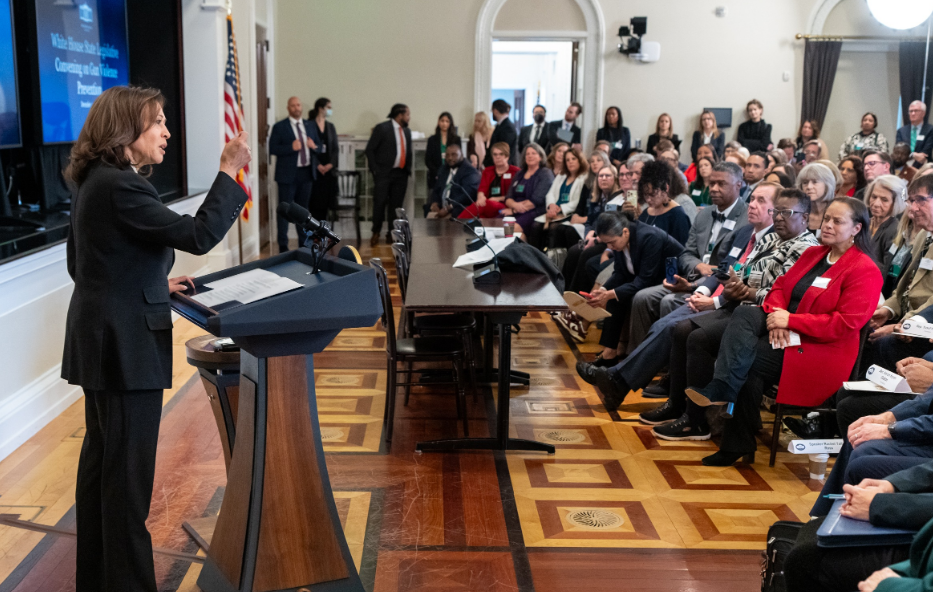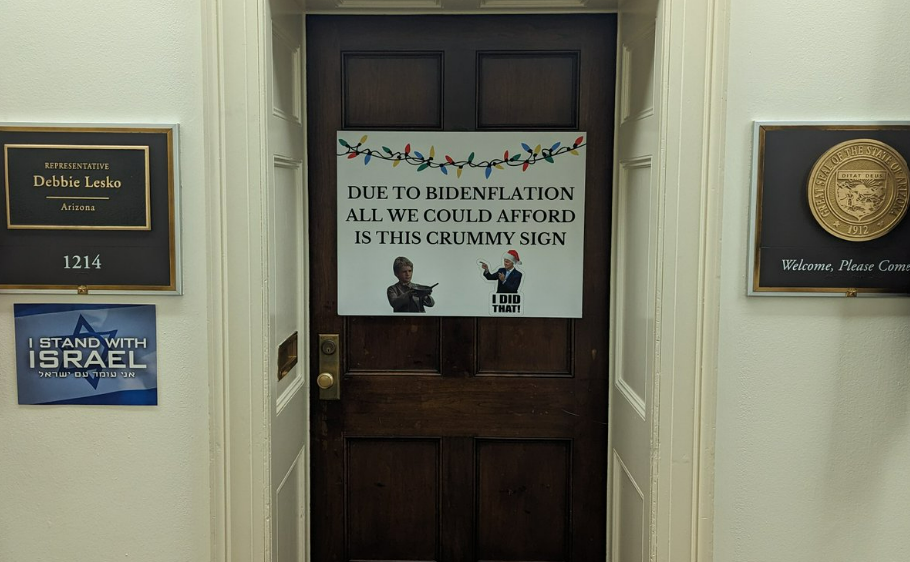
by Daniel Stefanski | Dec 18, 2023 | Education, News
By Daniel Stefanski |
Arizona’s schools chief is continuing his quest to make state schools safer.
Last week, Arizona Superintendent of Public Instruction Tom Horne released a number of recommendations from his administration’s task force meant to strengthen school safety.
Superintendent Horne said, “The safety of our schools is of the utmost importance. There is no greater nightmare than to contemplate a maniac shooting up a school and it’s essential that everything is done to increase campus safety. This committee has done remarkable work and now the task is to get these proposed changes implemented so we can make the state’s school safety program even stronger.”
A handful of the recommendations from the task force involve changing state laws, which the Arizona Legislature would have to approve through legislation and then the governor would have to sign. Those changes are as follows:
- Removing barriers to allowing retired law enforcement officers to work as School Resource Officers.
- Allowing for the school safety program to pay for School Safety Officers and school psychologists in addition to the other positions currently included in the program.
- Adding increased mental health training to focus on adolescent mental health issues, education privacy law and civil rights matters.
- Adding language to the law requiring attention to school architecture, ingress and egress and safety technology and training.
The task force also recommended steps for the Arizona Department of Education to enact within its statutory responsibilities, including the following:
- Reviewing and providing additional safety training and materials.
- Hosting an annual conference for educators, law enforcement and mental health professionals.
- Pursuing partnerships with entities that can help encourage workforce development in the social work and mental health sectors.
According to Horne’s office, his task force “consists of educators, legislators, representatives of mental health professions, law enforcement, and other community leaders.”
With the next legislative session just weeks away, the recommendations from the school safety task force may come at a perfect time to put the issue in front of lawmakers returning to work in January. Since school safety is a priority of Horne and his administration, he and his team will surely be lobbying for these changes and attempting to work with legislators from both sides of the aisle as they attempt to keep Arizona boys and girls safe at their schools.
Daniel Stefanski is a reporter for AZ Free News. You can send him news tips using this link.

by Corinne Murdock | Dec 17, 2023 | News
By Corinne Murdock |
Three of Arizona’s Democratic state lawmakers convened for a strategy session on gun control with Vice President Kamala Harris on Wednesday.
State Reps. Jennifer Longdon (D-LD05), Analise Ortiz (D-LD24), and Stephanie Stahl Hamilton (D-LD21) were invited to participate in the Biden administration’s inaugural Office of Gun Violence Prevention (OGVP) and Safer States Agenda. The trio declared in a press release that gun violence constituted a public health crisis that required immediate intervention.
“Despite overwhelming public support to act, Republicans in the legislative majority have consistently refused to hear any efforts to reduce gun violence,” said the trio. “Reps. Ortiz, Longdon and Stahl Hamilton said now is the time to redouble efforts to overcome Republican intransigence, not step back from a public health crisis.”
The Safer States Agenda proposed a series of progressive, state-led initiatives: establishing an office of gun violence prevention in every state; investing in community violence intervention programs; funding community policing initiatives; implementing lethal means safety measures such as off-site storage sites and Extreme Risk Protection Orders (also called “red flag laws”); establishing victims services and trauma recovery centers for gun violence survivors; establishing a gun violence crisis response team; implementing stricter firearm storage laws; requiring reporting of lost and stolen firearms; confiscating firearms from domestic abusers; requiring universal and enhanced background checks; banning assault weapons, high-capacity magazines, and ghost guns; requiring gun dealer licensing, recordkeeping, information sharing, and physical security; and end gun manufacturer’s immunity from liability.
President Joe Biden established OGVP in September and appointed Harris to oversee it. Ortiz, Longdon, and Stahl Hamilton were three among 100 state lawmakers from across the nation invited to strategize with OGVP.
After Wednesday’s meeting, Harris said that the proposed gun control measures wouldn’t conflict with the Second Amendment.
“It is a false choice to suggest that we have to choose between either upholding the Second Amendment or passing commonsense gun safety legislation,” said Harris. “Congress must have the courage to act, but until they do, the states must lead the way.”
The Department of Justice also published two model pieces of legislation to require stricter firearms storage and mandatory reporting of lost or stolen firearms.
The director of OGVP, Stefanie Feldman, was Biden’s longtime policy director dating back to the president’s first term as vice president under former President Barack Obama. While Donald Trump was president, Feldman served as the policy director for the Biden Institute.
One of the deputy directors of OGVP, Gregory Jackson, formerly directed the Community Justice Action Fund: a nonprofit focused on gun control and criminal justice reform, and a project of the dark money network offshoot, Tides Advocacy. The other deputy director, Rob Wilcox, formerly led federal policy for Everytown For Gun Safety, the gun control organization founded by major Democratic donor Michael Bloomberg.
Corinne Murdock is a reporter for AZ Free News. Follow her latest on Twitter, or email tips to corinne@azfreenews.com.

by Corinne Murdock | Dec 17, 2023 | Economy, News
By Corinne Murdock |
Rep. Debbie Lesko’s office showed off this year’s Christmas decorations available to them due to “Bidenflation”: a single, plain sign poking fun at historic inflation rates.
“Due to Bidenflation all we could afford was this crummy sign,” read the sign, with a classic depiction of Charles Dickens’ Oliver Twist begging for more food with an empty bowl of porridge, next to a picture of a Christmas hat-wearing Biden pointing at Twist with the caption “I did that!”
Lesko explained in a post that “Bidenflation” had a detrimental impact on her office’s tradition of decorating for Christmas.
“It’s a long-standing tradition that the second floor of Longworth is decorated for Christmas,” said Lesko. “My staff and I wanted to participate, but with Bidenflation who can afford it?”
The Bureau of Labor Statistics (BLS) reported last month that the Consumer Price Index (CPI) of all items increased by 3.2 percent compared to last year, with food at about three percent higher, all other items at four percent higher, and energy down over five percent.
On Tuesday, the BLS confirmed a .1 percent increase in the CPI last month, noting that overall cost of living reflected in the shelter index offset the decline in the energy index.
The greatest increases occurred in the cost of meals eating out, medical care commodities (drugs, medical equipment, and supplies), and services less energy services including shelter and transportation.
Meals at home increased by 1.7 percent: cereals and bakery products increased by 3.4 percent; meats, poultry, fish, and eggs increased by .1 percent; dairy and related products decreased by 1.4 percent, fruits and vegetables increased by .4 percent, nonalcoholic beverages and beverage materials increased by 2.9 percent, and all other foods increased by 3.3 percent.
Eating out increased by 5.3 percent: full service meals and snacks increased by 4.3 percent, and limited services and meals increased by six percent.
Energy commodities decreased by 9.8 percent: gas decreased by 8.9 percent and fuel oil decreased by 24.8 percent. Energy services decreased by .1 percent: electricity increased by 3.4 percent, while utility gas decreased by 10.4 percent.
Commodities less food and energy commodities sustained their price levels: new vehicles increased by 1.3 percent, while used cars and trucks decreased by 3.8 percent; apparel increased by 1.1 percent; medical care commodities increased by five percent; alcoholic beverages increased by 2.9 percent; and tobacco and smoking products increased by 7.7 percent.
Services less energy services increased by 5.5 percent. Shelter increased by 6.5 percent, with rent of primary residence increased by 6.9 percent and owners’ equivalent rent of residences increased by 6.7 percent.
Transportation services increased by 10.1 percent: motor vehicle maintenance and repair increased by 8.5 percent, motor vehicle insurance increased by 19.2 percent, and airline fare decreased by 12.1 percent.
Medical care services decreased by .9 percent, with physicians’ services decreased by .7 percent and hospital services increased by 6.3 percent.
Under President Joe Biden, the CPI hit a four-decade high last June: a 9.1 percent increase.
Annual inflation rates under former President Donald Trump averaged out to 1.9 percent: 2.1 percent in 2017, 1.9 percent in 2018, 2.3 percent in 2019, and 1.4 percent in 2020. The average annual inflation rates under Biden — factoring in 2021, 2022, and the latest inflation rate from this year — sits at over 5.5 percent.
These increases translate to Arizonans having to spend tens of thousands of dollars more for everyday necessities on average.
A study released earlier this year found that the average Arizona household must spend over $13,300 more to maintain the same standard of living they had in January 2021 — the state with the third-highest averages, just after Utah and Colorado.
The Thanksgiving dinner table may have also looked different this year. This year’s annual American Farm Bureau reported an average cost of $61 for a basic 10-person Thanksgiving dinner, down three dollars from last year but still eight dollars higher than 2021.
The average gas price in Arizona is currently at about $3.30.
Biden administration officials indicated to reporters this week that they anticipate 2024 will bring a continued decline in inflation. The Federal Reserve didn’t modify interest rates on Wednesday; Chairman Jerome Powell indicated that they would cut them next year.
Corinne Murdock is a reporter for AZ Free News. Follow her latest on Twitter, or email tips to corinne@azfreenews.com.

by Daniel Stefanski | Dec 16, 2023 | News
By Daniel Stefanski |
This week, national Republican and Democrat candidates for President of the United States met the filing deadline to appear on a March 19th election ballot in the Grand Canyon State. Nine Republicans and seven Democrats will be on the ballot for voters of their respective parties to choose from.
The 45th President of the United States, Donald J. Trump, headlines the Republican side, which also includes fellow challengers Ron DeSantis (Governor of Florida), Nikki Haley (former Ambassador to the United Nations), Chris Christie (former Governor of New Jersey), and Vivek Ramaswamy (Entrepreneur).
President Joe Biden, the 46th American Commander in Chief, overshadows the field for his Democrat Party.
A fair number of candidates with significant name ID remain on the Republican side in addition to the former president, but the choices for Republicans will likely be whittled down to two candidates by the time March 19th rolls around – thanks to several primaries in states around the country before Arizona’s contest. In 2016, the last time the state hosted a competitive Republican preference election, Trump and U.S. Senator Ted Cruz were essentially the last two candidates standing in Arizona, even though more names were on the ballot.
Though there are more than three months remaining until the Arizona Presidential Preference Election, former President Trump appears to have a commanding lead over any of his Republican competitors. According to a November poll of the primary field by Noble Predictive Insights, Trump’s numbers in the November survey grew to 53% of the Republican electorate (up from 50% in July), while Governor Ron DeSantis lost three points (19% from 16%). Ambassador Nikki Haley doubled her standing from the July report, acquiring eight percent of the Arizona GOP field (from four percent in July). Vivek Ramaswamy remained at nine percent.
A recent AZ Free News voter poll conducted by Data Orbital also revelead that nearly 4.5 percent more of Arizona voters prefer former President Donald Trump over current President Joe Biden
The primaries and causes will soon start when the calendar turns to 2024, and candidates look to shore up the requisite number of delegates to win their party’s nomination. On Monday, January 15, Iowans will caucus to kick off the election schedule. New Hampshire will then follow on Tuesday, January 23. There will be 14 states holding primary elections on ‘Super Tuesday,’ March 5.
Daniel Stefanski is a reporter for AZ Free News. You can send him news tips using this link.

by Corinne Murdock | Dec 16, 2023 | Education, News
By Corinne Murdock |
An unidentified man believed to be behind a string of back-to-back attempted kidnappings and sexual assault at the University of Arizona (UArizona) has yet to be apprehended.
So far, three female UArizona students have reported instances of being followed and/or attacked by the mystery man to police. The incidents occurred on Dec. 6, 7, and 11. The UArizona Police Department (UAPD) have partnered with the Tucson Police Department (TPD), Oro Valley Police Department (OVPD), FBI, and Marshal Service on the investigation.
In a press conference on Wednesday, TPD Assistant Chief Chris Dennison provided an update on their investigation. Although several victim reports indicate that one suspect was behind the attempted kidnappings and assault, Dennison didn’t rule out the possibility of multiple perpetrators.
Dennison confirmed that TPD is working with the victims to create a sketch of the suspect. Dennison explained that the FBI offered assistance with evidence processing and technology, OVPD has offered patrolling and augment resources, and the marshals offered surveillance assistance.
UAPD Chief Chris Olson said they were also partnering with safety aides and student community service officers to bolster its patrol presence. Olson recommended that students not walk alone, and to wear one instead of two headphones when walking to maintain situational awareness.
Olson further encouraged students to utilize UArizona’s SafeRide program, ridesharing services, the LiveSafe app, and, if necessary, a UAPD escort.
UArizona’s Counseling & Psych Services also offered itself as a resource, with survivor advocate Jess Glass Walsh speaking on behalf of the department. Walsh said that her department has assisted over 900 students in the last five years.
The first victim was followed at approximately 11 am last Wednesday, but not apprehended by the suspect near North Campbell Avenue and East 3rd Street.
The second victim was walking around 8th Street and Mountain Avenue last Thursday around 8 pm when the suspect jumped out of his car and grabbed her from behind. The suspect released the victim once she dropped to the ground and screamed. The suspect was described as wearing an orange fleece hoodie.
On Monday, the third victim reported that she was groped but not injured by the mystery man near East 7th Street and North Vine Avenue, just south of the UArizona campus. The man was wearing an orange shirt and jeans, but the victim didn’t notice a vehicle nearby.
UAPD described the suspect as a Hispanic-looking man with a close buzzcut around six feet tall and 30 to 40 years old. He reportedly drives a dark blue four-door hatchback or crossover vehicle with a dented front bumper, tinted windows, and an Arizona back license plate and no front license plate. The vehicle may be a Toyota Camry or Corolla.
UArizona officials warn students against walking alone, especially after dark, and have deployed additional patrolling officers to increase campus security. Law enforcement has also requested that members of the community register with TPD’s open camera registry to help track down the suspect.
Corinne Murdock is a reporter for AZ Free News. Follow her latest on Twitter, or email tips to corinne@azfreenews.com.

by Daniel Stefanski | Dec 15, 2023 | Economy, News
By Daniel Stefanski |
On Wednesday, Republican lawmakers held a press conference to announce their plan to “ease the financial burden hitting hardworking Arizonans when they fill their gas tanks…by addressing fuel blend requirements in Arizona.”
The fuel blend issue at Arizona pumps has long been a point of contention between legislative Republicans and the Hobbs’ administration, leading to this proactive attempt at a solution on the lawmakers’ side. According to the press release issued by the State Senate Republican Caucus, “Arizona is required to provide drivers in Maricopa County a specific fuel blend for cooler season months and a different fuel blend specific for warmer season months.” The blend employed by the state during spring and summer is “Cleaner Burning Gas” (CBG) – a boutique blend dictated by statute and procured from outside the state, which can lead to shortages and higher prices for consumers filling up their tanks at critical times of the year.
Faced with this issue of a very limited set of approved fuel blends, Arizona legislative Republicans announced that they had “identified eight comparable blends” in their free-market proposal to allow “as many fuel blends as possible.”
“We believe the EPA can and should approve those blends for use, as they provide nearly identical clean air benefits as CBG,” said Senate President Warren Petersen. “Providing multiple fuel options allows the market to compete during unexpected shortages and helps keep gas prices low for Arizona drivers.”
Senator Justine Wadsack, the bill’s sponsor, added, “The Legislature was not made aware of the shortage until after it had happened. As part of our plan, we’re proposing the Legislature be immediately notified if a waiver is requested by refineries, and that the Senate President and House Speaker are provided the authority to file a waiver request directly with the EPA. Hardworking Arizonans are struggling in this economy. Turning a blind eye to crippling gas prices is like throwing salt on their wounds. As lawmakers, we should do everything in our power to improve the lives of our citizens who elected us to represent them.”
The issues raised by Wadsack refer to previously induced information this year that the Governor’s Office was convinced by the EPA not to submit a waiver for an “alternative fuel type to provide an adequate supply for drivers and preventing a hike in gas prices,” despite oil companies warning state officials of significant refinery shutdowns and past Arizona Governors applying for and receiving that opportunity. According to Senate Republicans, “this catastrophe reduced the supply of the CBG (fuel blend).”
In an exclusive statement to AZ Free News, Representative Austin Smith said, “I applaud my fellow freedom caucus colleagues, Kolodin and Wadsack, for being the leaders on this issue. Every Arizonan, specifically in Maricopa County, has felt the pain at the pump under the Biden administration. Katie Hobbs could have led on this issue with requesting a waiver from the EPA, but failed to do so. As Vice Chairman of the House Energy committee, I look forward to seeing the proposals come forward this upcoming session. It’s the upmost importance to deliver real solutions to working Arizona families where we can.”
Earlier this year, Senator Jake Hoffman unleashed a blistering rebuke of Hobbs’ reported failure “to do the right thing by requesting this waiver to allow prices at the pump to drop.” Hoffman’s statement followed the aforementioned accounts of a letter that had been sent to Hobbs in March by independent petroleum refiner HF Sinclair, warning the state’s chief executive “of a critical supply shortage in Arizona due to an unexpected equipment failure stopping the production of CBG required by the Biden Administration in Maricopa County, as well as parts of Pinal and Yavapai Counties.”
At the time, Hoffman said, “Katie Hobbs’ incompetence as Arizona’s Governor continues to take center stage, and hardworking Arizonans are paying the price for it. The average price for a gallon of gas right now in Maricopa County is a full $1 higher than the national average. This is extra money that could help with groceries, medications and other necessities many of our taxpayers are having a difficult time affording because of the Biden Administration’s reckless policies leading to historic inflation.”
Senator Shawnna Bolick, who also attended the Wednesday press conference, told AZ Free News that “earlier this year, a proposed waiver that would have helped Arizonans save millions at the pump was rejected by an unelected government bureaucracy. During the critical supply shortage of CBG this spring it would have been invaluable to have this legislation to increase the availability of multiple gas blends instead of the current monopoly. It is time to remove unnecessary excessive red tape and open the market to competition to help Arizonans counter the Biden inflationary economy.”
Daniel Stefanski is a reporter for AZ Free News. You can send him news tips using this link.






